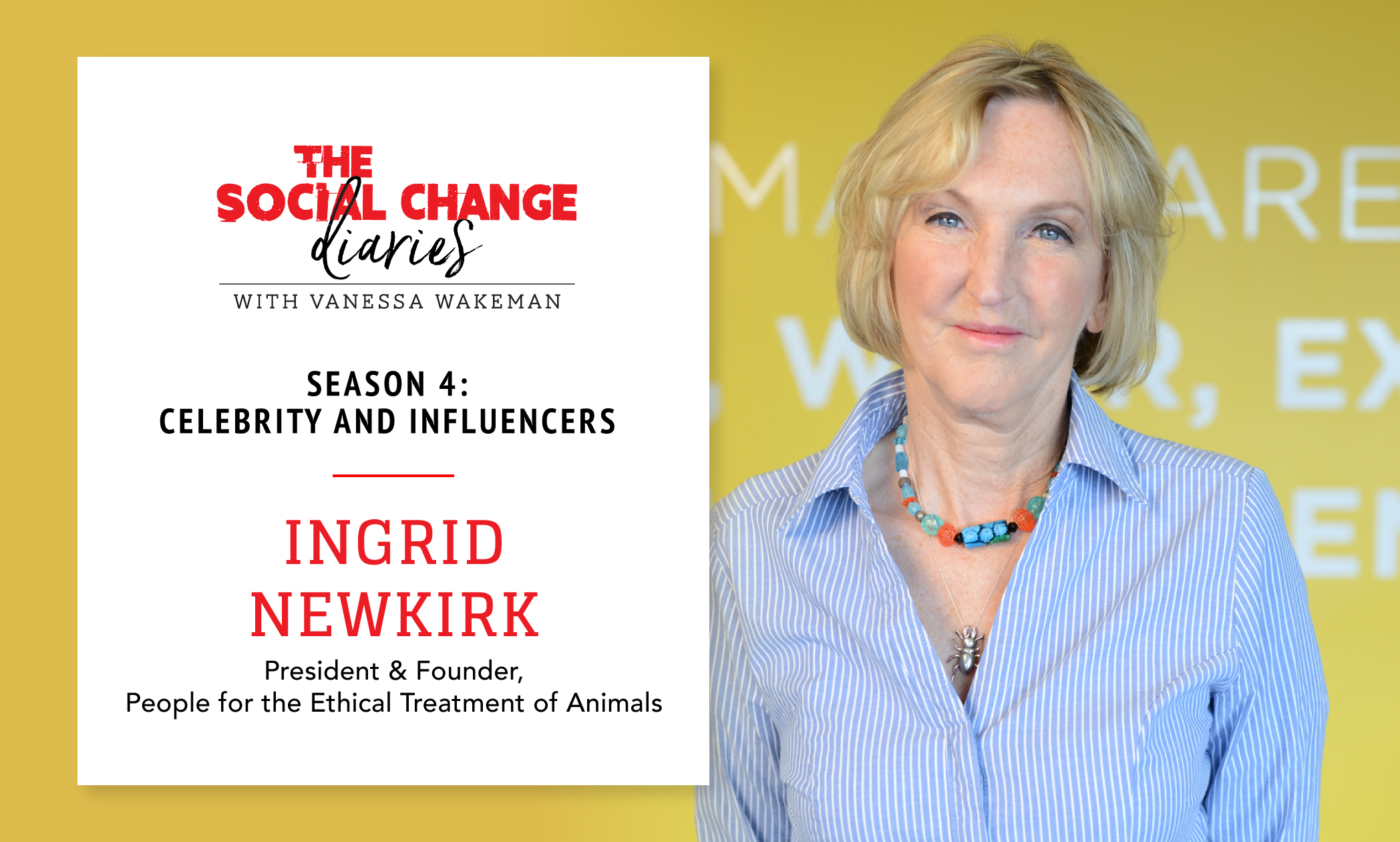
About This Episode
Vanessa thought it would be fitting to launch the new season on Celebrity and Influencers, with Ingrid Newkirk, the President and Founder of People for the Ethical Treatment of Animals (PETA). Long before she working in the social change sector, Vanessa marveled at how impactful PETA was and how effective their communications and marketing were. Over the past three decades, PETA’s influence has grown substantially. In this dialogue, Ms. Newkirk sheds light on the ways in which PETA has managed to stay true to its founding principles, while also evolving and becoming increasingly relevant in the midst of a dramatically a changing cultural landscape.
About Ingrid Newkirk
People for the Ethical Treatment of Animals (PETA) is the largest, most influential animal rights organization in the world, with more than 6.5 million members and supporters worldwide. Since its inception almost 40 years ago, PETA’s influence has grown substantially, evolving its relevance despite rapidly changing times.
Ingrid Newkirk is the President and Founder of PETA. She was born in Surrey, England, and lived in Europe until she was 7 years old, when she and her parents moved to India. She has always been drawn to animals and often rescued abused cattle and stray dogs during her childhood. After moving to the U.S., she served as a deputy sheriff and was a director of cruelty investigations for the Washington Humane Society/SPCA (the second-oldest humane society in the U.S.). She has also been a Maryland state law-enforcement officer for 40 years and currently serves in an advisory capacity on various animal-protection boards.
Ms. Newkirk’s efforts led to the passage of legislation to create the first spay-and-neuter clinic in Washington, D.C. She coordinated the first arrest and conviction in U.S. history of a scientist on cruelty-to-animals charges and helped pass the first anti-cruelty law in Taiwan. Other firsts include the first felony charges of cruelty to animals involving a factory farm after PETA conducted an investigation of a pig farm in North Carolina as well as the first felony charges of cruelty to factory-farmed birds as a result of a PETA investigation of turkey farms in West Virginia.
Ms. Newkirk spearheaded the closure of the Department of Defense’s underground “wound laboratory” and the closure of the largest horse slaughterhouse in North America, and she has initiated many other successful campaigns against animal abuse, including ending all crash tests on animals. Her investigation of the Indian leather trade was covered by BBC’s Woman’s Hour, among other shows. As a result of PETA’s campaign against cruelty in the Australian wool industry, during which Ms. Newkirk personally visited farms in Australia, live flaying of lambs is declining. She has spoken on innumerable college campuses and at international symposia, and she addressed the international peace conference in the Middle East in 2005.
Ms. Newkirk is the author of more than a dozen books in several languages, including her latest, Love for Animals, Large and Small, as well as The PETA Practical Guide to Animal Rights and One Can Make a Difference, which contains essays by His Holiness the Dalai Lama, Paul McCartney, Moby, the Rev. Al Sharpton, Helen Thomas, Sean Astin, and other people who have worked to effect positive changes. Her other books include The Compassionate Cook, Let’s Have a Dog Party!, 50 Awesome Ways Kids Can Help Animals, Making Kind Choices, The PETA Celebrity Cookbook, Animal Rights Weekend Warrior, You Can Save the Animals, Free the Animals, Kids Can Save the Animals, and 250 Things You Can Do to Make Your Cat Adore You.
Ms. Newkirk’s campaigns to promote cruelty-free living have made the front pages of virtually every newspaper in the U.S. and the U.K. and have also been featured in The Times of India, The Washington Post, and countless magazines and other periodicals. She was named a top businessperson of the year by Fortune magazine and Washingtonian of the Year by the Washingtonian. She has been profiled in The New Yorker, The New York Times Magazine, Time, and twice in People, and she was also featured in Forbes magazine. She has appeared on The Colbert Report, The Today Show, The Oprah Winfrey Show, Larry King Live, Politically Incorrect With Bill Maher,Crossfire, Nightline, 60 Minutes, Voice of America, and 20/20, among others, and she enjoys a lively debate and the opportunity to show how easy it is to make animal-friendly choices. She has been the subject of two documentaries: the BBC’s Ingrid Newkirk: The Naked Revolutionary and HBO’s award-winning I Am an Animal.
In her words…
“I always go back to be bold, be true to yourself, be true to your ideals, don’t just tell people what they want to hear and what they’re comfortable with. Be polite, be respectful, but push ahead. Our ability to put those new ideas into play is what has generated a lot of buzz and bought a lot of people to the organization. Some to make fun, some to cast stones, but a lot of people to wake up, open their eyes, their hearts, their minds and change. And that’s why we exist.” “We’ve always had our eye on what’s happening at the time and the mood of the country- on what the press is covering- and we play into that. In the early days, animal rights was such a new idea. It was considered so extraordinary. Nobody had even heard the words and we were given a lot of air time for debate and discussion. We could easily go a national show on television and be able to bring up the issues in a sensible way. But those days are gone. The media is mostly reality shows and specialist channels. It’s what Kim Kardashian is doing today. So we concentrate on boiling the message down to the sound bite. We keep abreast of what’s going on and are part of the current conversation. That’s key.” “We are pretty much true to our founding principles. We decided from the start that we are edgy envelope pushers. If you tell people what they already know, what’s the point? So we decided early on that we are not here to win a popularity contest. We are not here to attract everyone. We are here to make some principled points and hope that people pick up on them.” “We have an expression here: we are not institutionally driven. We are not number driven. We will not change our modus operandi or tone it down because some of our members say, ‘I can’t go along with that’ or ‘that’s offensive and if you do that, we will withdraw our support.’ I have members who say, ‘you should only be doing this.’ Members who say ‘you should only be doing that.’ So we say thank you so much. We are going to be doing what we think is best. We are envelope pushers. We have a very novel message, so if that makes you too uncomfortable, then please support another organization that is helping animals. There are many because unfortunately animals suffer in so many diverse ways, but if you don’t like our tactics, there’s a wide field there, but we are not member driven.” “If a celebrity says something, everybody has a look. I hate to draw the analogy of a car wreck, but you know, if there’s a car wreck, you have to have a look. If a celebrity does something, you have to have a look. And it’s really so powerful.” “We would rather not disrupt anything. Wouldn’t it be nice if you just gave people the facts and they thought, ‘good grief, I don’t want to be part of that horrible thing. I’ll stop.’ But of course, change is always resisted and sometimes you have to make a fuss. But I say, be bold. Be the person who says, ‘excuse me, I think that’s wrong.’ It may annoy some people, but overall, it’s useful. Somebody has to speak up and sometimes that means being loud.” “Believe if you build it, they’ll come. Do the best you can and plow ahead. Never be discouraged by negativity or trolls. We’ve got a world now with all this nastiness. Don’t pay any attention to it. Water off a duck’s back. Don’t get bogged down in anything petty. Small organizations talk to me sometimes and say things are going well and then everybody started fighting and I say to them, ‘if you don’t want to go along with what I’m doing here, good luck to you. Please start your own thing or find another place to go and do what you want to do, but this is what I want to do and please wish me luck too’ and then just do what you think you should do. Obviously research to inform your decisions, but be true to your beliefs. Don’t worry about success, worry about doing.”
Questions Answered on this Episode
What changes have you seen within the nonprofit landscape over the 40+ years after founding PETA and how has PETA not only remained relevant, but managed to increase its influence through rapidly changes times?
What were some defining moments in PETA’s history that highlighted for you that your team was on the right track and had really captured the attention of your audience in a meaningful way?
PETA is one of the first examples that we have seen where the power of influencers and celebrities has been used to build and grow a movement. Was that an intentional, strategic decision?
Comparative to other animal welfare organizations, PETA has used disruption as a tool to garner awareness for its key initiatives. While that has been effective in advancing change, it also has resulted in widespread backlash against the organization at times. Can you talk about the role of disruption as a tool for building influence for a social movement?
We have a new generation of activists and change makers within the social justice world. Can you talk about one or two things are you seeing that are exciting or inspiring to you?
Many of our listeners are from smaller organizations, often working at the community level. Are there any tips you can share that you believe are valuable to an organization in building influence and growing their supporter base?
Many nonprofit organizations struggle to find corporate support or celebrities to promote their cause. What should they be thinking about to effectively build these relationships?
What advice would you give to a listener who has just taken the helm or started a nonprofit organization and is having challenges finding their voice as an influencer?
I do a lot of work with women in the sector around developing their thought leadership platforms and one of things I ask them to think about is their legacy. Do you ever think about what you have built throughout your career and how history will tell your story?

